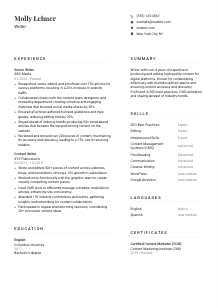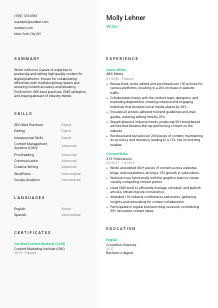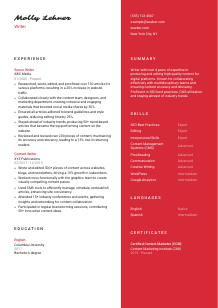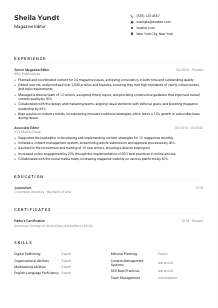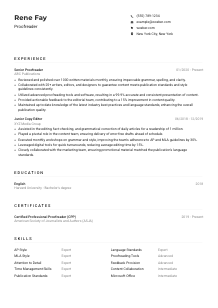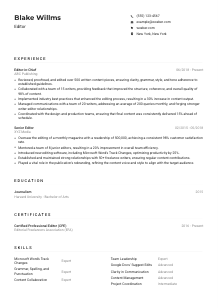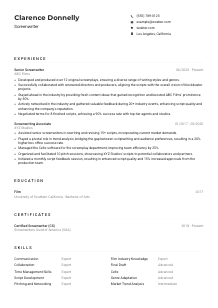Writer Resume Example
Weaving words, but your resume reads flat? Dive into this Writer resume example, penned with Wozber free resume builder. Discover how smoothly you can draft your literary prowess to match job narratives, turning your career story into a bestseller!
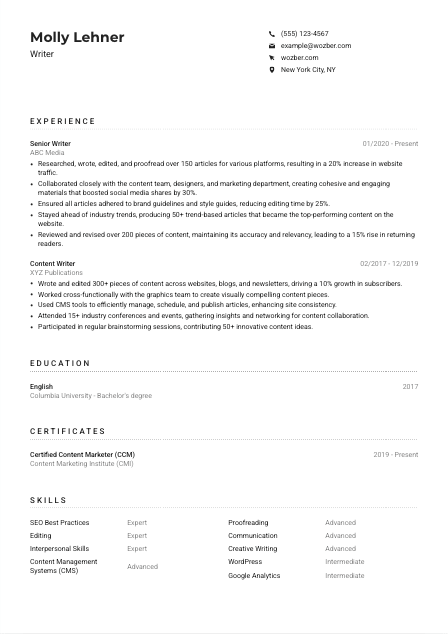
How to write a Writer resume?
Greetings, aspiring wordsmith! In the realm of creativity and deadlines, standing out as a Writer is more akin to an art form than mere chance. Your resume isn't just a document; it's a portfolio, a testament to your journey in crafting narratives and engaging content.
Armed with Wozber's free resume builder, we're set to navigate the nuances of sculpting a resume that resonates vibrantly with your dream Writer role. Let's transform your career canvas into a masterpiece that captivates from the very first word!
Personal Details
Your personal details are akin to the title of your latest piece – it needs to grab attention and inform. Let's ensure this section isn't merely factual but narratively engaging and perfectly aligned with your Writer role aspirations.
1. Name as Your Headline
Consider your name the headline of your career story. Ensure legibility and prominence, akin to how you would entitle a critical piece. This isn't just administrative detail; it's the masthead of your professional narrative.
2. Job Title Echo
"Writer" - placing the job title directly beneath your name acts like a thesis statement for your resume. It's immediate, declarative, and tells hiring managers right off the bat that you're in your element.
3. Contact Essentials
Channel your inner editor when listing your contact information. A typo here isn't just a faux pas; it's akin to a plot hole in your narrative. Ensure your phone and email are meticulously proofread - they're the call to action in your tale.
4. The Setting of Your Story
Mentioning "New York City, NY" not only matches the job's geographic requirements but places your career story within its vibrant, bustling setting. This detail assures employers you're part of the city's narrative fabric.
5. Web Presence as Your Portfolio
If you have a professional website, blog, or portfolio, include it. This is your exhibition space, where your narrative skills and content creativity go beyond the resume and become tangible to the reader.
Takeaway
Your Personal Details section isn't just an introduction. It's the inciting incident in your professional tale. It hooks the reader, sets the scene, and beckons them into your narrative. Craft it with as much care as your finest compositions.





Experience
The Experience section is your plot – it's where your character is tested, grows, and ultimately shines. Reflecting your journey vividly and relevantly is key to resonating with the role of a Writer. Let's sculpt your experiences into compelling chapters of your career story.
- Researched, wrote, edited, and proofread over 150 articles for various platforms, resulting in a 20% increase in website traffic.
- Collaborated closely with the content team, designers, and marketing department, creating cohesive and engaging materials that boosted social media shares by 30%.
- Ensured all articles adhered to brand guidelines and style guides, reducing editing time by 25%.
- Stayed ahead of industry trends, producing 50+ trend‑based articles that became the top‑performing content on the website.
- Reviewed and revised over 200 pieces of content, maintaining its accuracy and relevancy, leading to a 15% rise in returning readers.
- Wrote and edited 300+ pieces of content across websites, blogs, and newsletters, driving a 10% growth in subscribers.
- Worked cross‑functionally with the graphics team to create visually compelling content pieces.
- Used CMS tools to efficiently manage, schedule, and publish articles, enhancing site consistency.
- Attended 15+ industry conferences and events, gathering insights and networking for content collaboration.
- Participated in regular brainstorming sessions, contributing 50+ innovative content ideas.
1. Delineate the Plot Points
Like breaking down a narrative structure, identify key moments in your professional journey that reflect the Writer job's requirements. Every bullet point here is a scene in your career, each with its development arc.
2. Cast of Characters and Settings
For each role, introduce the setting (company name) and your character's role (job title) clearly. The period of your tenure sets the time frame for this chapter in your professional story.
3. Driving the Plot: Achievements
Narrate your key achievements in each role with an eye for storytelling. Did an article you write boost website traffic by 20%? That's a pivotal plot twist worth highlighting. Quantify your successes to give them weight and dimension.
4. Engage with Details and Numbers
Details matter. Saying 'Researched and wrote 150+ articles' frames the canvas of your dedication and breadth of work. Numbers lend credibility to your narrative, providing tangible evidence of your impact.
5. Relevance Is Key
Just as every scene should drive the story forward, ensure every listed experience is relevant to the Writer role. Superfluous information distracts and dilutes your career narrative's impact.
Takeaway
Craft each entry in your Experience section with the same care as you would a feature article or a compelling book chapter. These aren't just jobs; they're the milestones and achievements that define your journey as a Writer. Choose the scenes wisely, and make every word count.
Education
While seemingly more straightforward, your Education section can significantly enrich the backstory to your protagonist – you. Let's ensure this part of your resume fills in your narrative with depth, showing how prepared you are to take on the Writer role.
1. Identifying the Foundation
First, spotlight the exact degree title that fits the job's requirement – 'Bachelor's degree in English'. This isn't just an educational credential; it's the cornerstone of your narrative, providing the skill set for your journey.
2. Crafting the Scene
Present the institution and graduation date in a clear, concise manner. Think of it as setting the scene where part of your character development takes place.
3. Beyond the Degree
While your English degree aligns perfectly with the job's requirements, don't shy away from highlighting relevant coursework or activities that further contribute to your role as a Writer.
4. Additional Layers
Include honors or extracurricular projects only if they add value to your Writer persona. This is akin to including relevant backstory elements that enrich your character without diverting from the narrative's course.
5. Lifelong Learner
Though the resume example doesn't delve into ongoing education, always consider mentioning any post-graduation courses or workshops if they add to your arsenal as a Writer. Continuous learning is a trait of great protagonists.
Takeaway
Your Education section is the backstory that proves your qualifications and sets you on your journey towards becoming the Writer you aim to be. Let it showcase the depth of your knowledge and your commitment to the craft.
Certificates
Certificates can highlight specialized training or achievements that add depth to your professional persona. Think of them as side quests that have granted you unique abilities or recognition within your field.
1. Identifying Relevant Achievements
Start by considering what special skills or knowledge the Writer position may benefit from. While the job description may not specify, certifications like 'Certified Content Marketer' showcase dedication and a sharpened skill set.
2. Specializations Showcase
Highlight certificates that resonate with the core requirements of being a Writer, allowing you a moment to shine in areas that perhaps your education or experience sections haven't covered.
3. Dating Your Quests
Indicating when you achieved your certifications can help depict your journey's timeline and your commitment to continuous learning, vital attributes for any Writer navigating the ever-evolving digital landscape.
4. Never Stop Questing
Your drive for acquiring new certifications or attending workshops speaks volumes about your commitment to the craft. Regularly updating this section reflects a dynamic, evolving protagonist eager to conquer new challenges.
Takeaway
Your Certificates section is a testament to your dedication to honing your craft and expanding your expertise beyond the foundational. Like successful side quests, they enrich your narrative, adding layers of skill and specializations that make your Writer persona even more compelling.
Skills
A Writer's skill set is a unique blend of creativity, technical prowess, and an unwavering attentiveness to detail. Let's plot out the most striking skills in your arsenal, ensuring they're perfectly aimed at the heart of what makes an exceptional Writer.
1. Extracting the Essence
Pour over the job description and identify both the explicit skills required and the implicit ones hinted at. Skills like 'SEO Best Practices' and 'Proofreading' aren't just bullet points; they're the tools of your trade.
2. Tailoring Your Toolkit
Match your skills to the job's requirements, ensuring you highlight those abilities that make you not just a Writer, but the Writer for this role. Your selection should paint a portrait of a meticulous, creative, and versatile professional.
3. Order and Precision
Like arranging a bookshelf to showcase the most treasured titles, organize your skills to front those most relevant to the position. This isn't about showing off every skill you've acquired; it's about curating the most compelling collection.
Takeaway
Approach your Skills section as a carefully curated display of your finest tools as a Writer. Each listed skill should serve a purpose, contributing to a snapshot of you that is not only impeccably matched to the job but also distinctly impressive.
Languages
In the rich tapestry of writing, the ability to weave narratives in multiple languages can be a distinctive advantage. Let's explore how listing your linguistic abilities can add color and diversity to your professional portrait, particularly in the cosmopolitan hub of New York City.
1. The Plot Requirement
The job description might center around English, but understanding the nuances of other languages can offer unexpected depth to your content. Highlight your proficiency in English first, but don't shy away from showcasing other linguistic talents.
2. The Language Palette
List languages in order of proficiency, starting with those most relevant to the job. This isn't just about fluency; it's about demonstrating your capacity to engage with diverse audiences and enhance narrative depth.
3. Measuring Fluency
Clarity is key. Use clear, straightforward terms to indicate your proficiency, ensuring there's no ambiguity about your ability to contribute to projects requiring linguistic diversity.
4. The Role's Linguistic Scope
While the primary focus might be on English content, acknowledge the role's potential for wider audience engagement through additional languages. This shows foresight and a global perspective, valuable traits in any writer.
5. The Multilingual Narrator
Your linguistic skills reflect more than just the ability to communicate; they offer insights into your ability to understand and connect with varied cultural narratives. Embrace this aspect of your identity as a global storyteller.
Takeaway
Your linguistic prowess is an extension of your narrative skills, opening doors to broader audiences and richer stories. Whether through subtleties of dialect or cultural nuances, each language you speak adds a unique chapter to your tale as a Writer in the global narrative. Showcase them with pride.
Summary
The Summary section is your hook – it's what draws the reader in, compelling them to dive deeper into your narrative. Crafting a summary that encapsulates your essence as a Writer, while aligning seamlessly with the role's requirements, sets the stage for a captivating career story.
1. Setting the Scene
Start with an overarching statement that captures your identity as a Writer. This isn't just about your profession; it's about the unique blend of skills, experiences, and passions that define you.
2. Key Plot Points
Highlight your proficiency in areas directly relevant to the job – from your adeptness with SEO best practices to your proven track record in enhancing website traffic through compelling content. This gives a snapshot of your capabilities and achievements.
3. Brevity is Wit
Keep your summary concise, yet impactful. Aim for a balance between brevity and depth, ensuring each word serves a purpose in portraying your professional identity.
4. The Intriguing Protagonist
End on a note that leaves them wanting more. Your summary should not only reflect your qualifications but also hint at the depth of character and creativity you'll bring to the role.
Takeaway
Your Summary is the heart of your professional narrative. It's where you distill your essence into a few compelling lines, capturing the essence of your journey and the value you bring as a Writer. Craft it with care, and let it serve as your invitation to the reader to explore the depth of your story.
Launching Your Writer Journey
With each section finely crafted and your narrative threads woven together, your resume stands ready as a monument to your dedication, creativity, and skill. Embrace the process with the passion of a storyteller, and let every line of your resume be a testament to your prowess as a Writer. Use Wozber's free resume builder, including free ATS-friendly resume templates and the ATS resume scanner, to ensure your story is not just heard but remembered.
Now, step forward into your next chapter with confidence. The page is yours to write.

- Bachelor's degree in English, Journalism, Communications, or related field.
- Minimum of 3 years of professional writing experience, preferably in digital platforms.
- Proficiency in using content management systems (CMS) and SEO best practices.
- Strong proofreading and editing skills with attention to detail.
- Excellent communication and interpersonal skills.
- The ability to communicate effectively in English is a key skill.
- Must be located in New York City, NY.
- Research, write, edit, and proofread content for various platforms including websites, blogs, and social media channels.
- Collaborate with the content team, designers, and other departments to create cohesive and engaging materials.
- Ensure all written materials adhere to brand guidelines and style guides.
- Stay updated with latest industry trends to produce relevant content.
- Regularly review and revise content to maintain its accuracy and relevancy.





